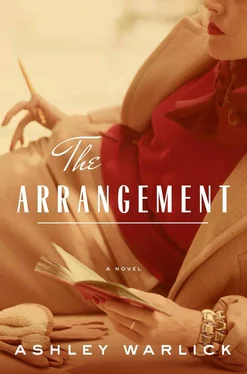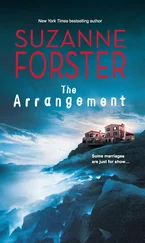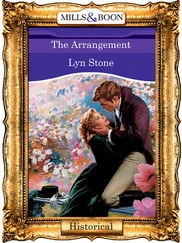“We’re here,” he said. “This is it.”
A stone house like the others they had passed, but this one in an open meadow, a fountain bubbling in front, spring-fed, ice cold on her fingertips. He motioned her forward, inside. It was dark and cold and smelled of old hay. The house would need more rooms, a kitchen, but the chimney was sound, and the hearth magnificent. Could they cook on the hearth? Could they chill things in the spring?
She stared at him.
“I have this idea,” he said, and he began to laugh again. “What if we all lived here together?”
* * *
And then they boarded the ship home, and it was over. Mrs. Parrish, still under the weather, hardly left her stateroom. The salon, exactly like the salon they’d enjoyed on the trip over, was full of German brewers headed to Milwaukee, the first drink of every evening in toast to the portrait of Adolf Hitler hanging at the end of the bar. They had found a woman, lean and giggling, the silvery drape of her dress like a wing. They were loudly pressing her with glass after glass of champagne.
Mary Frances held her chin in her hand, drawing a small map in the condensation on the tabletop. Tim watched the Germans with a kind of simmering concern; she could feel what he was feeling, as if they had exchanged skins.
“Tim,” she said, “what are we going to do?”
“We’re going to help that woman get out of here, for chrissake.”
“Tim.”
He looked at her then, and she saw how tired he was, the dark circles beneath his eyes. He couldn’t tell her what they were going to do. He didn’t know how they would do it.
He stood and extended his hand for hers, tucking it against his heart, and they left the salon, the pink piano, the girl in the silver dress still laughing with panic, her wrist in the grip of a monocled man. In the dining room, the cabin boys were decking the walls with pine boughs, preparing for the woodland feast. It was as if they were living it all in reverse.
In her room, Tim pulled the red satin coverlet from the bed, and they lay down on the white sheets in their evening clothes. She had begun to cry, and he turned to her so he could see her face, reaching out and lifting her chin.
“You don’t need to hide from me,” he said. “And you don’t need to stop.”
She covered her face, and he took her hands in his, pressed them to his own hot cheeks, his neck and ears. She tried to apologize, and he told her to stop. This is what they were doing now.
“And then we will think of something else.”
“I can’t,” she said.
“You will.”
“I can’t leave Al. He is so very sad. We can’t.”
“No.”
“And you can’t come back to California.”
“So we have no choice, darling. Imagine that. We have no other choice.”
His own eyes were filling now, and she felt something in her head snap and heave forth blackly. The sound she made seemed to come from somewhere else in the room and he put his mouth down on hers to take it from her and that’s all they suddenly seemed capable of, throwing their bodies over each other like shields. He pushed the top of her dress down her shoulders to get to her skin.
In the middle of the night, he told her he would write to Al of Vevey, of the orchard and the lake below, the stone fountain and the little house they could make bigger, how they could all go there together and make it something new, for the three of them. Al was her husband, and Al was his friend, and this was a human thing they’d made together, all three of them. She listened to his voice in the darkened room, the spotlight moon shining from the porthole, the ship’s rolling beneath her, his breath on the back of her neck, and she knew she’d do anything he asked of her, anything he could think of.
“But this,” she said, and she reached over, closing her hand around him, his body already rising to the same thought. She turned and pushed him onto his back, her feet flat beside his hips, her sex settling down. “But this.”
He reached between them, and his touch shot through her.
“We can’t have this anymore.”
Vevey, Switzerland, Fall 1936
Al sat in the café overlooking Lac Léman and knew the decision to come here had been the right one. There were no pages in front of him, no whores chattering past, this was not Dijon or Paris, this was a Swiss town, and the Swiss did not go in for whores the way the French did. And there was no cassis. He drank a strong black coffee and felt the autumn afternoon on his face, the sinking, chilly light off the water, and he knew this would be the place where everything changed.
Upstairs, in the pension, his wife unpacked their trunks, making their home the way she had when they’d first married, and there was comfort in that. They had money; he’d sold the car, whatever furniture Mary Frances had not wanted to store at the Ranch, they had stripped their lives down to the wires — typewriters, wool overcoats, sturdy shoes, a small collection of records and books. Each other, perhaps — it was hard to say.
He had not written in over a year. He had come to blame California.
When Mary Frances returned in the spring, it had already been in his mind to move away from there — to leave the Kennedys, the college, his own mother, still lost in the uncharted territory of her widowhood; it made him guilty to read her letters, made him feel as though he should take the train north immediately, but when he got there, he felt like he should shoot himself. And the Ranch was worse, the Kennedy press and need of each other, all of it suffocating. He had been looking for a way to begin again, and then Tim’s letter arrived with this idea that they all return to Vevey. They could make a place to work, and live a life free from the past, and Al knew he was talking about Hollywood and Gigi and the little white bungalow in Laurel Canyon, but also that Tim saw his predicament. Tim had always understood him.
Now he was anxious for Tim to arrive — they had expected him to meet their train at the station, and they had waited with their trunks on the platform, Mary Frances blanching with nerves or travel. She had been so quiet since they left California. Al knew part of her was reluctant to make this leap, and as he watched her knot and unknot the handkerchief in her lap at the station, he realized it hadn’t mattered to him. She never talked about her book, and he would have given his eyeteeth for such a contract. She had been reluctant to have children, and he felt as if they’d lost their chance now. They were doing this instead. Sometimes when he looked at Mary Frances, she seemed like a stranger to him; he watched her bring a cigarette to her red mouth and thought how this was not the girl he’d married.
Tim had sent the caretaker Otto to meet them, a barrel of a man, barely topping Al’s shoulder with the crown of his hat, which he immediately wadded in his big square hands. Mary Frances kissed both his cheeks. He appeared to be weeping, perhaps with joy at seeing her, perhaps with allergies. The accent here was frighteningly thick; it seemed as if he said Tim would be in on the six-fifteen, that they should all have dinner together and begin their grand plans.
Mary Frances had laughed and closed her eyes. “Grand plans,” she said.
Al didn’t understand. “What other kind should we make?”
And so what had been quiet between them turned cold, and Mary Frances did not want to leave the rooms at the pension for a café. She needed a nap, she said, but she seemed skittish. She needed, he suspected, to be away from him.
Al sighed, sipped the last gritty dregs from his cup. It was understandable, of course. They had been married seven years this month, spent the last several weeks crammed against each other in various forward-moving, earth-chewing hunks of metal, and he could not remember their last deliberate contact, their last touch or whispered conversation. It had been weeks of shucking their old lives for this new one, and the fit was still awkward.
Читать дальше












